 134 citations,
June 2005 in “Neuropsychopharmacology”
134 citations,
June 2005 in “Neuropsychopharmacology” GABRA2 gene variations impact alcohol response, and hair loss medication finasteride reduces some effects.
 129 citations,
October 2000 in “British Journal of Dermatology”
129 citations,
October 2000 in “British Journal of Dermatology” Finasteride helps increase hair growth in men with hair loss.
 127 citations,
June 2006 in “International Journal of Pharmaceutics”
127 citations,
June 2006 in “International Journal of Pharmaceutics” Liposomes and niosomes improve finasteride delivery for hair loss treatment.
[object Object]  122 citations,
July 1990 in “Teratology”
122 citations,
July 1990 in “Teratology” Finasteride exposure in pregnancy causes genital abnormalities in male rats.
 113 citations,
April 1999 in “The Journal of Clinical Endocrinology and Metabolism”
113 citations,
April 1999 in “The Journal of Clinical Endocrinology and Metabolism” Cyproterone acetate-estrogen most effective for hirsutism, but consider side effects and patient needs.
 109 citations,
April 2000 in “European Urology”
109 citations,
April 2000 in “European Urology” Finasteride lowers risk of urinary issues and surgery by over 50% in 4 years.
 105 citations,
January 2004 in “The Journal of Urology”
105 citations,
January 2004 in “The Journal of Urology” Finasteride improves chronic pelvic pain, saw palmetto doesn't.
 99 citations,
October 2006 in “BMC clinical pharmacology”
99 citations,
October 2006 in “BMC clinical pharmacology” Finasteride may cause slight depression and anxiety.
 98 citations,
April 1997 in “The Journal of Steroid Biochemistry and Molecular Biology”
98 citations,
April 1997 in “The Journal of Steroid Biochemistry and Molecular Biology” Finasteride effectively blocks rat enzymes, but with varying methods and strength.
 97 citations,
January 2014 in “Journal of The American Academy of Dermatology”
97 citations,
January 2014 in “Journal of The American Academy of Dermatology” Dutasteride 0.5 mg works better than finasteride and placebo for increasing hair in men with hair loss.
[object Object]  94 citations,
January 2000 in “The Journal of Clinical Endocrinology and Metabolism”
94 citations,
January 2000 in “The Journal of Clinical Endocrinology and Metabolism” Spironolactone most effective for hirsutism, but has side effects.
 90 citations,
January 2003 in “The Journal of Urology”
90 citations,
January 2003 in “The Journal of Urology” Finasteride may reduce prostate bleeding by lowering blood vessel growth factor levels and blood vessel density in certain prostate areas.
 88 citations,
October 2002 in “Journal of Dermatology”
88 citations,
October 2002 in “Journal of Dermatology” Finasteride for hair loss may cause depression, affecting sleep and relationships.
 86 citations,
July 1993 in “Drugs”
86 citations,
July 1993 in “Drugs” Finasteride treats enlarged prostate, shrinks it, improves urination, but may cause sexual dysfunction and isn't for women or children.
 81 citations,
June 2014 in “American Journal of Men's Health”
81 citations,
June 2014 in “American Journal of Men's Health” Finasteride can cause lasting sexual, emotional, and cognitive issues, with varying severity.
 75 citations,
October 1999 in “European journal of endocrinology”
75 citations,
October 1999 in “European journal of endocrinology” Finasteride is a safe, effective treatment for hirsutism with fewer side effects.
 70 citations,
June 1993 in “Biochemistry”
70 citations,
June 1993 in “Biochemistry” Finasteride slowly binds to 5-alpha-reductase, affecting enzyme stability and inhibitor potency.
 69 citations,
July 1997 in “Der Urologe”
69 citations,
July 1997 in “Der Urologe” Sabal and Urtica extract works as well as finasteride for treating BPH, with fewer side effects.
 66 citations,
June 2013 in “Journal of Dermatological Treatment”
66 citations,
June 2013 in “Journal of Dermatological Treatment” Finasteride and dutasteride effectively treat hair loss, but may cause side effects like sexual dysfunction and depression.
 66 citations,
June 2006 in “Journal of The American Academy of Dermatology”
66 citations,
June 2006 in “Journal of The American Academy of Dermatology” Finasteride increases hair weight and count in men with hair loss, with best results after four years.
 64 citations,
June 2010 in “Journal of The European Academy of Dermatology and Venereology”
64 citations,
June 2010 in “Journal of The European Academy of Dermatology and Venereology” Finasteride improves hair density and thickness in women with hair loss.
 63 citations,
March 2001 in “Fertility and Sterility”
63 citations,
March 2001 in “Fertility and Sterility” Diane 35 plus finasteride is more effective for treating hirsutism.
 62 citations,
March 2013 in “JAMA Dermatology”
62 citations,
March 2013 in “JAMA Dermatology” Finasteride reduces Hidradenitis Suppurativa flare-ups in children and teens, but long-term safety is unknown.
 62 citations,
April 2004 in “Expert Opinion on Pharmacotherapy”
62 citations,
April 2004 in “Expert Opinion on Pharmacotherapy” Finasteride effectively treats male pattern baldness, improving hair growth and density.
 60 citations,
December 1998 in “Clinical Pharmacology & Therapeutics”
60 citations,
December 1998 in “Clinical Pharmacology & Therapeutics” Both drugs lower DHT levels, with GI198745 being more effective.
 58 citations,
April 2017 in “The Journal of Steroid Biochemistry and Molecular Biology”
58 citations,
April 2017 in “The Journal of Steroid Biochemistry and Molecular Biology” Post-finasteride patients show changed neuroactive steroid levels, possibly causing erectile dysfunction and depression.
 56 citations,
January 2015 in “Circulation”
56 citations,
January 2015 in “Circulation” Finasteride helps reduce heart issues and improves heart function.
 56 citations,
April 2003 in “Fertility and Sterility”
56 citations,
April 2003 in “Fertility and Sterility” All three treatments reduce hirsutism, but spironolactone works best long-term.
 54 citations,
August 2005 in “Alcohol”
54 citations,
August 2005 in “Alcohol” Finasteride affects alcohol intake in male mice, possibly due to neurosteroids.
 52 citations,
January 1995 in “The Journal of Clinical Endocrinology and Metabolism”
52 citations,
January 1995 in “The Journal of Clinical Endocrinology and Metabolism” Finasteride and spironolactone both reduce hirsutism, but finasteride lowers androgen levels more.






























